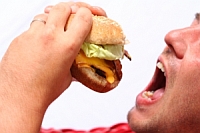How To Beat the Freshman 15
 I’m sure you’ve heard about — or lived through — the freshman 15. This is the rumored first year of college where freshman pack on approximately 15 pounds in their first year. Is it real? As a victim, I’m said to say that yes, it is. Studies have also shown that students are likely to pack on an incredible amount of weight throughout college — not only are you vulnerable during your first year.
I’m sure you’ve heard about — or lived through — the freshman 15. This is the rumored first year of college where freshman pack on approximately 15 pounds in their first year. Is it real? As a victim, I’m said to say that yes, it is. Studies have also shown that students are likely to pack on an incredible amount of weight throughout college — not only are you vulnerable during your first year.
Why the weight gain? Let’s tackle this obvious question first. For many, college is the first time you’re not under mom and dad’s watch and there are a lot of temptations in the way. Student meal plans often afford unlimited meals or snack points, so you’re often eating food when you don’t even realize it. Additionally, college can be stressful, and an easy way to deal with stress can be to chow down on some chocolate or something yummy.
Beware of the dangers: Temptations and freedom come at a cost. Weight gain can puts you at risk for diabetes and can give you high blood pressure, high cholesterol, less energy, breathlessness, and joint pain/problems. It’s especially difficult to get out of this slump if you’re already somewhat overweight — and this can put you in heart disease or obesity territory.
Avoid the problem: As much as you may hate your servings of fruits and vegetables, if you’re studying and need a snack, add carrots to the mix. Drink water — lots of it. Evaluate your eating and exercise habits and make adjustments. If you live on a big campus, walk to class and don’t take the shuttle bus. Cut some snacks and be cognizant of your food intake. Many times, you’re eating food without realizing it, and that extra 200 calories is totally not worth the hassle.
You can also attempt these other tried and true techniques to avoid the problem:
- Don’t eat while stressed out. If you must have something, drink water.
- Eat slowly and enjoy your food! You have no idea how much of a difference it makes to actually pay attention to what you’re consuming. Studies show that individuals who were forced to rush their food intake eat approximately 170 calories than those who actually sit down and take their time.
- Don’t skip meals. Chances are, the healthiest food is available during campus dining hours. You don’t want the dining room to be closed and then relegate to the Mars bar. It’s not worth it.
- Don’t snack — but if you do, go with the healthy stuff and a bottle of water.
- Where you can, take the low-fat options. The taste is usually not that much different.
- Ignore the temptations for the vending machines! Sure, it may be cheaper than your local grocery store, but it’s a trap.
I’ll talk about some good diet options in future columns on the blog, but if you’re concerned, seek out friendship and motivate yourself to fix the weight problem with your peers. There are a lot of students who have the same concerns as you do. Just be open about it. You may want to also speak with your campus doctor for health options. Also, take advantage of the campus gym — it’s almost always free to students. Finally, get enough sleep. As tempting as the all-nighters sound, it adds to the stress that contributes to overeating.
The weight gain is almost inevitable during the college years, but with a few changes in your lifestyle and a bit of discipline, you can overcome this obstacle and keep yourself incredibly fit during your school years.


Here are some of the strategies my friends pursued: (1) go to Thailand, eat dodgy chicken sandwich, get salmonella; (2) go to Ibiza, smoke lots of cigarettes and snort lots of powder; (3) bulimia.
I had always had access to lots of good food. Going off to college meant adjusting to the dorm dining commons (decent, but never very good).
On top of that, I was walking a lot more, on more-hilly terrain. And there were finally PE classes that could hold my interest, like swimming and martial arts.
All in all, I ended up losing weight when I went off to college. It was only when I bought a car, halfway through grad school, that I started regaining that weight.
You also might look into some of the recent research on the effectiveness (or lack thereof) of low-fat diets. I find that having fat for breakfast is a good idea, as it keeps me full through lunch time. Actually, anything hard-to-digest tends to work, whether that means eggs, or a whole-wheat bacon-and-grilled-cheese sandwich, or steel-cut oatmeal. It’m sure it’s better not to have a fatty dinner, and I hardly ever do anymore except for special occasions. I’m more likely to skip dinner than breakfast.
Something that wasn’t mentioned here that is probably one of the largest factors is the availability of beer and other alcoholic drinks. One beer contains at least 100-200 calories, and the chances of feeling like exercising more than one beer off the next morning are probably slim. My freshman companions who drank heavily every weekend gained much more weight than those of us who didn’t (some of us even lost weight due to walking around to classes).
Most girls beome boozebags too when they finally leave home. They start chugging more beer than they did in HS and it def. adds some pounds.
Eat as much as you want. Do not exercise, but instead play video games. Sitting there doing nothing + eating all day will ensure that you do not gain the freshman 15, but a whopping freshman 40. Why stop at 15?
What did it for me was the all you can eat buffets when I use to live in the dorms…taking gallon size bags home of chicken fritters and stuff wow…no wonder I gained that 10-15lbs but now i’m a poor college student not on a food plan so yay for mac and cheese and ramen…oh and being a bike messanger ha
“Don’t snack”
“take the low fat option”
don’t eat while stressed out”
I’m sure you’ll agree, this is revolutionary stuff…
Hmm. Not sure how long it’s been since you’ve been to college, but joining the university gym is most certainly not free. Unless you’re parents are paying for it.
Walking to class (instead of driving or taking the campus bus) is always a good way to burn calories. Also, watch what you eat at the cafeteria. There aren’t many low-fat options, so stick with fresh fruits and veggies.
Thirdly, watch your beer intake. I didn’t gain much weight until my sophomore year, when I took a job with people who partied all the time. Yikes.
Freshmen 15…more like Freshmen 50!
I think there’s such a thing as “the grad student 40”, and I’m a grad student so I probably ought not be advising undergrads on how to keep off that measely 15 😉
Actually, I’ve mostly managed to avoid the weight gain so here’s what I do:
-Beverages : an essential tool for studying. I mix it up, combining teas (herbal, green, oolong, black.. anything!), coffees (only one with caffeine), water, water+Emergen-C, seltzer, juice etc. Beverages keep me from chewing on my pen and putting cookies in my mouth.
-Find an exercise routine. Seriously, you have no reason to believe me, but if I can fit it into my schedule, you can too. You may have to seriously work to motivate yourself, but it’s worth it. I do yoga DVDs at home to save time, or just make up my own yoga routines.
-As the article mentions, If you can make dining hall hours, definitely go. I lived in the campus snack bar as an undergrad, and put on weight eating pizza and cookies.
-Get a bike! Walk or bike if you can, and avoid the motor transport.
-Do physical things during your breaks from working, like walking down the hall to visit a friend or doing some chores. In fact, if you’re reading this, go do a lap around your room or apartment now 😉
I gained at least 50 pounds between freshman year and graduation, mostly because I had never been told how to eat right. I also attended a school in the South where fried chicken and fish was on the menu every week. My advice is to skip the cafeteria and grab a George Foreman grill. I figured out later that whatever I cooked myself was way better than whatever I was eating at the cafeteria and McDonald’s. The biggest thing though is to avoid late night meals. After a hard night of partying nothing is more tempting than Dennys or a Subway sandwich, but I found it best to skip the “fourth meal” altogether. Heavy meals + sleep = fat booty.
Beer and other booze packs on the pounds amazingly fast. By graduation I gained 30 pounds. After grad school (thanks to de-stress boozing and stress eating) I had packed an extra 45! I got into Weight Watchers and reilzed what the biggest thing was-alcohol.
Not only that, upon reuniting with old pals who lost tons of weight they ALL had one thing in common-they cut down on the beer
…and no, light beer is not that much better
I lost 15 pounds when I got to college. (not on purpose either) Just don’t stuff your face ever 10 minutes and you’ll be fine. It’s the snacking and being lazy that gets people. Get out and do something active you lazy bum!
I’ve lost about 40lbs since I’ve started college i am a sophmore now. The secret was our cafeteria has the calorie count of all of the food and I went online and found a calorie counter of what someone my size should be taking in daily and then tried to stick a few hundred calories below that because I knew the portions the servers handed me weren’t always exact. I also said whenever I was on the phone calling home or talking to anyone I had to be walking. I also couldn’t afford any snacks for my room but water so I think that’s helped me quite a bit.
very interesting, but I don’t agree with you
Idetrorce
I truly can’t understand those who think that they can lose fat with diets & pills. I mean, come on!!! Its not rocket science now, is it? Intake less calories than you burn and you will lose weight – yes, its that simple!!!
This article is very true, kids go away to college and can seem to find a balance on their eating habits.My daughter gained 20lbs but on the 4years of college she said it was due to stress. She has lost 10 since graduation but she now realizes that she needs to eat healthy and exercise more.